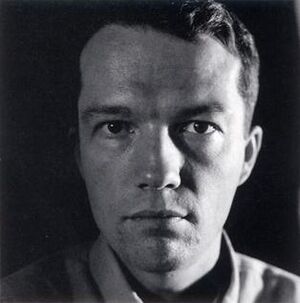George Brecht (nonfiction): Difference between revisions
(Created page with "George Brecht (August 27, 1926 – December 5, 2008), born George Ellis MacDiarmid, was an American conceptual artist and avant-garde composer, as well as a professional chemi...") |
No edit summary |
||
| Line 1: | Line 1: | ||
George Brecht (August 27, 1926 – December 5, 2008), born George Ellis MacDiarmid, was an American conceptual artist and avant-garde composer, as well as a professional chemist who worked as a consultant for companies including Pfizer, Johnson & Johnson, and Mobil Oil. He was a key member of, and influence on, Fluxus, the international group of avant-garde artists centred on George Maciunas, having been involved with the group from the first performances in Wiesbaden 1962 until Maciunas' death in 1978. | [[File:George Brecht.jpg|thumb|George Brecht]]'''George Brecht''' (August 27, 1926 – December 5, 2008), born George Ellis MacDiarmid, was an American conceptual artist and avant-garde composer, as well as a professional chemist who worked as a consultant for companies including Pfizer, Johnson & Johnson, and Mobil Oil. He was a key member of, and influence on, Fluxus, the international group of avant-garde artists centred on George Maciunas, having been involved with the group from the first performances in Wiesbaden 1962 until Maciunas' death in 1978. | ||
One of the originators of 'participatory' art, | |||
One of the originators of 'participatory' art, in which the artwork can only be experienced by the active involvement of the viewer, he is most famous for his ''Event Scores'' such as ''Drip Music 1962'', and is widely seen as an important precursor to conceptual art. | |||
He described his own art as a way of “ensuring that the details of everyday life, the random constellations of objects that surround us, stop going unnoticed.” | |||
== In the News == | == In the News == | ||
| Line 13: | Line 16: | ||
== Nonfiction cross-reference == | == Nonfiction cross-reference == | ||
* [[Art (nonfiction)]] | |||
* [[Chemistry (nonfiction)]] | * [[Chemistry (nonfiction)]] | ||
| Line 19: | Line 23: | ||
* [https://en.wikipedia.org/wiki/George_Brecht George Brecht] @ Wikipedia | * [https://en.wikipedia.org/wiki/George_Brecht George Brecht] @ Wikipedia | ||
[[Category:Nonfiction (nonfiction)]] | [[Category:Nonfiction (nonfiction)]] | ||
| Line 26: | Line 29: | ||
[[Category:Composers (nonfiction)]] | [[Category:Composers (nonfiction)]] | ||
[[Category:People (nonfiction)]] | [[Category:People (nonfiction)]] | ||
Latest revision as of 18:25, 3 December 2017
George Brecht (August 27, 1926 – December 5, 2008), born George Ellis MacDiarmid, was an American conceptual artist and avant-garde composer, as well as a professional chemist who worked as a consultant for companies including Pfizer, Johnson & Johnson, and Mobil Oil. He was a key member of, and influence on, Fluxus, the international group of avant-garde artists centred on George Maciunas, having been involved with the group from the first performances in Wiesbaden 1962 until Maciunas' death in 1978.
One of the originators of 'participatory' art, in which the artwork can only be experienced by the active involvement of the viewer, he is most famous for his Event Scores such as Drip Music 1962, and is widely seen as an important precursor to conceptual art.
He described his own art as a way of “ensuring that the details of everyday life, the random constellations of objects that surround us, stop going unnoticed.”
In the News
Fiction cross-reference
Nonfiction cross-reference
External links:
- George Brecht @ Wikipedia
